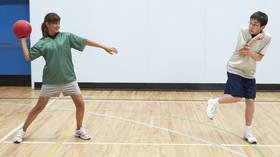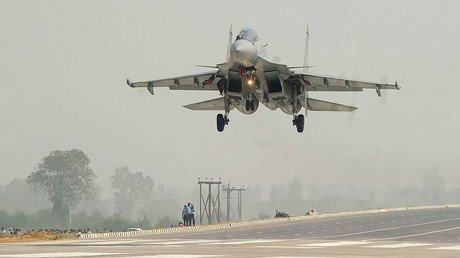Yes, dodgeball is a ‘TOOL OF OPPRESSION’ – but that doesn’t mean we should ban it

Forbidding children from playing a ball game to combat violence and injustice makes no sense as long as they have to survive in a world that is far more violent and unjust.
In one of those stories that was bound to birth a slew of political-correctness-gone-mad responses, Canadian scientists have presented as-yet-unpublished research showing that dodgeball is a form of “legalized bullying” that forms a part of the “hidden curriculum” of oppression in school.
To arrive at these findings, the team interviewed students about which gym class activities they disliked the most –where the ball-throwing game came in top place– and then, for reasons that are less than intuitively clear, decided to measure those answers against the Five Faces of Oppression, a model developed by the post-Marxist feminist philosopher Iris Marion Young.
Here are the five faces:
Exploitation: Using other people’s labors to benefit for oneself.
Marginalization: Relegating a group of lower standing to the edge of society.
Powerlessness: Those relegated have a lack of autonomy.
Cultural imperialism: Establishing the rules and customs of the ruling class as the norm.
Violence: Members of a group of lower standing know they may be subject to random, unprovoked attacks.
So technically, you could say that the house rules set by the teacher represent cultural imperialism, and that the poor throwers and dodgers that end up on the losing side are marginalized, powerless and subject to “violence.”
But if you stretch that model, which was initially developed for society-wide analysis, to dodgeball, you can probably apply it to anything else.
A classroom, where all the children have to sit in place for a set amount of time, where the teacher sets the rules, those who can’t keep up feel marginalized and attacked when they are forced to give stumbling answers in front of their peers, is a tool of oppression.
A workplace, where you have to clock in, where some are paid and praised more than others and the boss gives you a telling-off just because he or she can, is a tool of oppression.
Should we ban schools and offices as well?
Also on rt.com US will perish from PC-induced insanity unless universities become free-speech zones once againThe cooperative activities suggested by the Canadian team in place of dodgeball have the same potential pitfalls. The hierarchies and bullying inside a sports team can be many times worse than being hit on the shoulder with a projectile. Even if you do individual activities like running, some unfit, likely overweight kid will still be lapped. As for gymnastics and dance – yeah, of course there are no power games in ballet troupes, and no 13 year-old boy ever feels stupid dancing to Miley Cyrus.
You could say that a ban on dodgeball is in itself a form of authoritarian oppression towards the kids that enjoy it, from their adult superiors and their obsession with more and more rules.
It’s not even that the five faces model is so broad as to be meaningless (though dodgeball does trivialize it somewhat). It’s more that it applies too well to too many things in the world, even ones we’d rather accept than have to think about.
Also on rt.com ‘A simple fight may follow you for the rest of your life’: Schoolyard bullying a felony in MissouriSo, the question becomes not about eliminating oppression around us, but whether we should shield children from it.
The Anglo-Saxon world is entering its third or fourth decade of ubiquitous positive reinforcement psychology at school – participation trophies for all – and helicopter parenting at home.
Has it helped? There might be less violence, but socially the imbalance of power has not gone anywhere. To generalize, there might be fewer wedgies, older kids stealing lunches, or casual racist insults in the playground. But the tools of domination have only multiplied – who has the most Instagram followers, who has been shamed or cyber-bullied online. And still girls want to be with the quarterback, not the boy with over-active sweat glands and poor social skills.
On the other hand, the coddling from adult authority figures has produced a couple of generations that – without wanting to resort to 'snowflake' stereotypes – have found it difficult to reconcile their gold star-giving classrooms with the harshness of an increasingly competitive, insecure and unequal professional world.
So, dodgeball – a game, remember, not sanctioned street warfare – might be slightly harmful, or even a little character-building and fun, but most likely it just does not matter that much. Teenage then grown-up life will smack them in the face regardless.
Also on rt.com ‘Politically correct’ fancy ball: German kindergarten bans children from wearing costumes of IndiansMeanwhile, if they really want to effect social change, these leftist academics (and activists) should stop chipping away at these fussy, petty cultural issues: schoolyard games, micro-aggressions, arcane minority offenses, diversity in Hollywood films and who wears what at Halloween.
To fight oppression, they should attack the fundamental economic and political issues, otherwise the obsession on relative trivia without context makes them look unworldly and not a little ridiculous.
And one thing they should note is that, even in the world’s strictest ideologically egalitarian societies – the Soviet Union or Mao’s China – no one thought of stopping children from throwing soft objects, banding into teams, or keeping score.
By Igor Ogorodnev
Igor Ogorodnev is a Russian-British journalist, who has worked at RT since 2007 as a correspondent, editor and writer.














